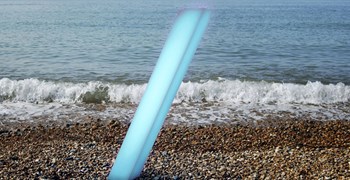Granddaughter's shock discovery leads to story of World War I conscientious objector who served as medic
This article originally appeared on Culture24.
Rarely-told tale of those who decided not to fight in World War I given greater coverage after granddaughter's shock discovery in York
 Ronald Priestman in a photograph taken by Walter Scott in 1916© York Museums Trust
Ronald Priestman in a photograph taken by Walter Scott in 1916© York Museums Trust The pay book seen by Priestman's granddaughter, Laura, at York Castle Museum© York Museums Trust
The pay book seen by Priestman's granddaughter, Laura, at York Castle Museum© York Museums Trust“I couldn’t believe it – I saw the pay book and then I saw next to it ‘A soldier’s pay book, R M Priestman from Ilkley, Quaker and pacifist’,” says Potts, who was amazed by the objects from her ancestor’s service in a Casualty Clearing Station at the front in France.
“I exclaimed to my friend, in the middle of the museum on a busy Saturday afternoon, ‘that’s my grandfather.’
“When I got home I looked into it, and later spoke to my mother and museum staff, and I discovered that my grandfather had donated several items to the museum.”
 Priestman donated his belongings to curators 50 years ago© York Museums Trust
Priestman donated his belongings to curators 50 years ago© York Museums Trust“I told the staff that we had more of my grandfather’s belongings from the First World War, including diaries and photographs, which Graham and I have now decided to donate too.
“The diaries and photographs my brother has sent to the museum provide a detailed account of daily life at a Casualty Clearing Station on the Western Front.
“My grandfather was a very special person in my life and my brother and I are very pleased to be able to follow his lead in donating to the museum.
“I’m so glad to be able to contribute to the little-heard story of those who decided on principle not to fight in the First World War.”
The new diaries will feature in a film as part of a new exhibition in the Community Rooms at the museum, curated by York Quakers.
“We were amazed to hear from Laura – this is such a rarity,” says Philip Newton, an Assistant Curator of History, who believes the objects and recollections of the family will give the display a “much more informative” context.
“Her grandfather’s items are of particular interest to us because we have relatively little in our collections relating to the Quakers during the First World War.”
Priestman wrote his diary daily between October 1914 and August 1916. Passages from the book will be transcribed on the museum’s website.
- 1914: When the World Changed Forever is at York Castle Museum. Visit yorkcastlemuseum.org.uk for more.
What do you think? Leave a comment below.
 The pay book is part of the Recruitment Office section© York Museums Trust
The pay book is part of the Recruitment Office section© York Museums Trust "You will produce this book whenever you require an advance of cash on account"© York Museums Trust
"You will produce this book whenever you require an advance of cash on account"© York Museums TrustAgreement to "maximise potential" of Britain's most intact First World War aerodrome Stow Maries
Last British survivor of Gallipoli Campaign to be country's first boardable World War I ship
First World War fashions from the Illustrated London News archive












